Bird parents are much more proactive than we might think. I have been told by wildlife rehabilitators that fledglings that fall from their nests a tad prematurely stand a far better chance being left where they are, than being scooped up by humans thinking to rescue them; the reason being that bird parents are proactive and continue to raise fledglings that have left the nest.
Of course, when we see a fledgling (a young bird that has most of its feathers but is still learning to fly) apparently helpless and abandoned, our instinct is to catch it and take it to a place of safety, but although well meaning, we might be depriving the youngster of its best chance. The best caretakers and raisers of young birds are in fact their parents.
For years a pair Southern Grey-headed Sparrows have nested under the eaves of the gable of our house, raising their babies each season. However, last week we found a fledgling in our dining room, hiding in a corner, sheltered between a cupboard and a wall from an interested cat, namely, Nougat who was patiently waiting to see what might happen next. It seems that the fledgling’s maiden flight from the nest went wrong, resulting in it accidentally flying in through an open window instead of into a nearby tree.
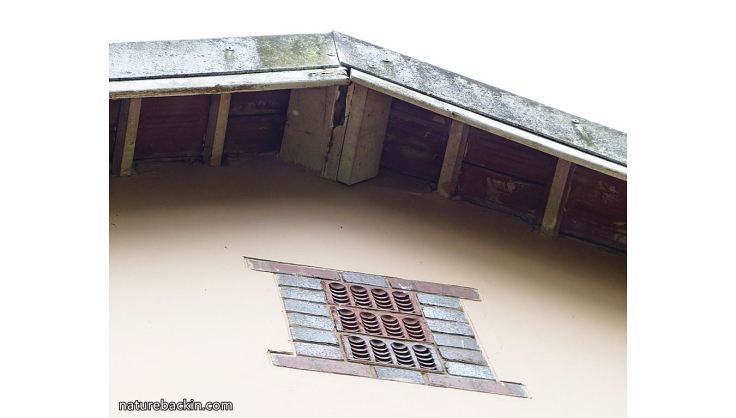
The sparrow’s nest is in a crevice in damaged rafters beneath the eaves at the gable of our house, high above the dining room window
After shutting Nougat out of the dining room, we moved the cupboard so as to be able to catch the baby sparrow and we took it outside to release onto the ground below the window where we hoped it would be seen by its parents. Amazingly, as we put it on the ground, one of the parent sparrows flew down and made brief contact with the fledgling and then seemingly disappeared. The fledgling tried unsuccessfully to fly, and flapped and hopped a few metres across the lawn. We interfered again to check to make certain it was uninjured. It seemed to be fine, so we backed off, hoping the parent would make contact once more. The fledgling managed to flutter towards the base of tree and then into some longer grass where it took cover.
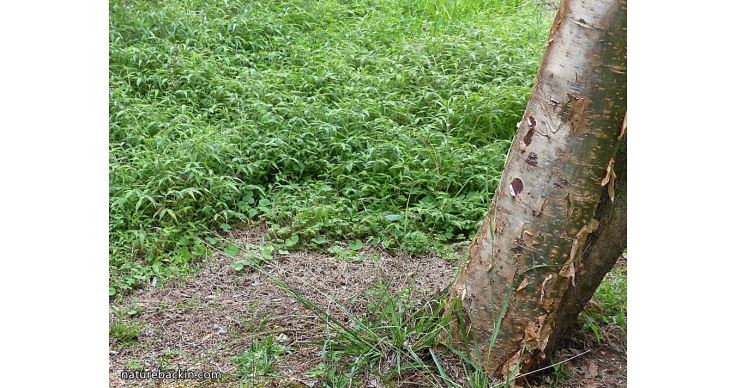
We had left this patch of grass uncut so that it could go to seed to provide food for birds and other creatures. It was in this patch of longer grass where the baby sparrow took cover
We watched through the dining room window for a bit and the parents did not return and the baby sparrow remained hidden, but when we checked again about half an hour later, the chick had emerged from the grass and was being fed by both parents. We were very relieved, and I decided to get my camera to try to record what might happen next. All the following photos were taken through the dining room window.
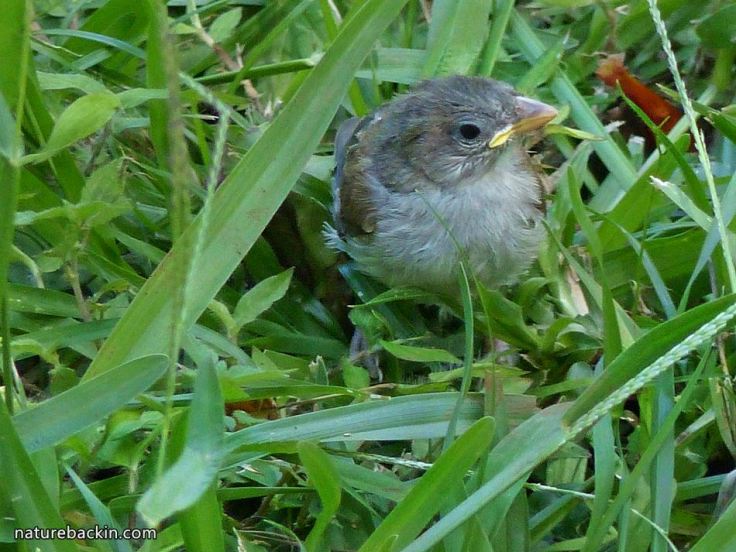
After receiving a good feed from both parents the baby sparrow fluttered further out onto the lawn. The parents meanwhile continued to fly up to feed the other fledglings that remained in the nest under the eaves

The fledgling appeared to be really tired and kept taking momentary naps

It then seemed to gain strength and hopped and fluttered towards the base of a nearby tree from where one of the parents was chirruping incessantly
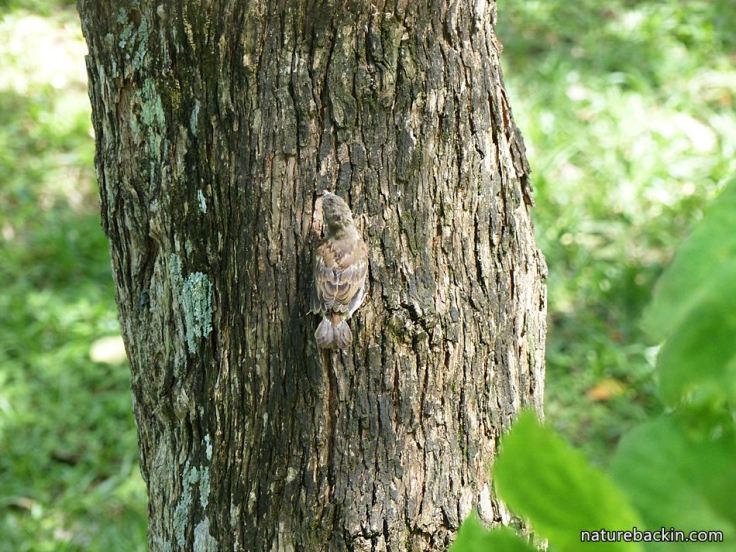
At first we thought the fledgling had taken cover in a shrub, but then it emerged climbing up the trunk of the tree, fluttering its wings now and again to help it ascend, seemingly encouraged by the chirruping parent higher up in the tree

It would rest now and again but made good progress up the trunk of the tree
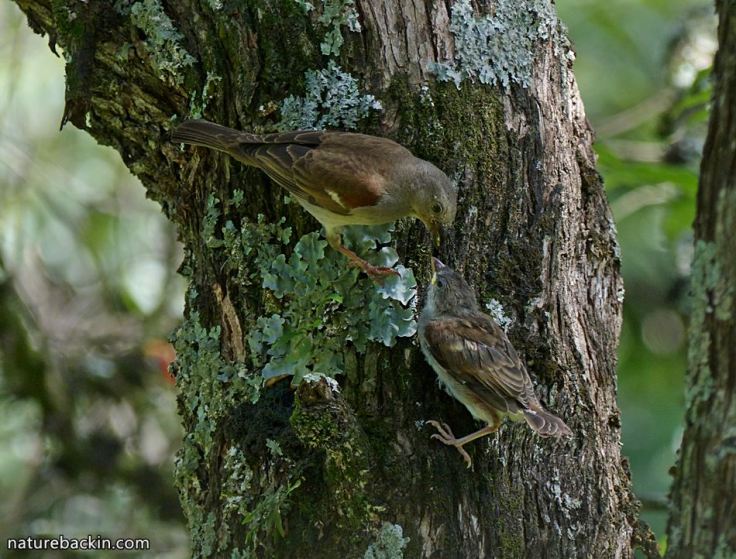
When it had climbed about 3 metres up the tree trunk one of its parents flew in to feed it and to offer reassurance
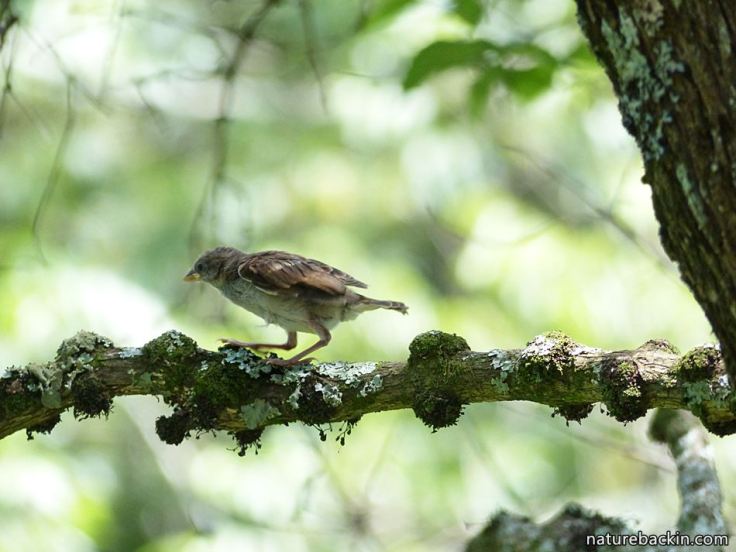
Once it was high enough to draw level with a horizontal branch the fledgling managed to totter along it with great determination even if a bit wobbly on its legs after a long climb
From what we had seen so far, the advice that bird parents are well equipped to manage fledglings that have left the nest, even fledglings that are not yet able to fly with confidence, was shown to be the case. The Grey-headed Sparrows communicated with the fledgling, protected it and fed it. In fact fledglings of many species of birds leave their nests before they are fully capable of flying, and their parents continue to raise them and guide them. The best thing that well-meaning humans can do is leave them to do this, but offer protection by keeping away so as not to disturb them, and also by keeping away dogs and cats that might endanger the birds at this vulnerable time.
Misguidedly attempting to “rescue” such fledglings interrupts normal bird parenting and developmental processes, and introducing such uninjured fledglings to captivity might reduce their prospects for survival.

Once high up in the tree, the fledgling settled down, and reverted to looking rather sleepy

Despite seeming sleepy, the fledgling was quick to solicit feeding when a parent approached to feed it
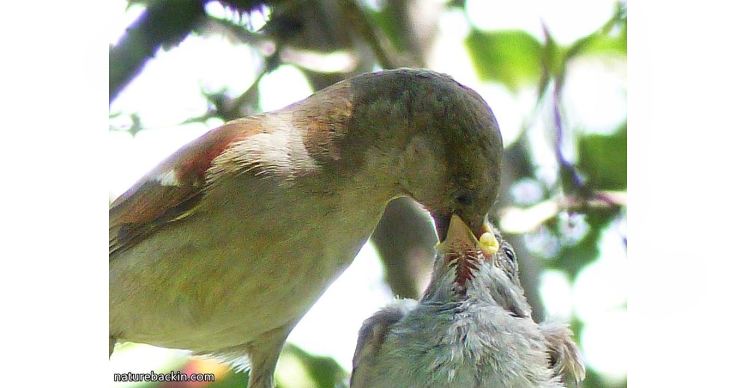
Both parents took turns feeding this fledgling and visiting the nest to feed the other babies that remained in the nest. (Because of intervening vegetation, unfortunately I had to overdo the zooming in to get these shots)
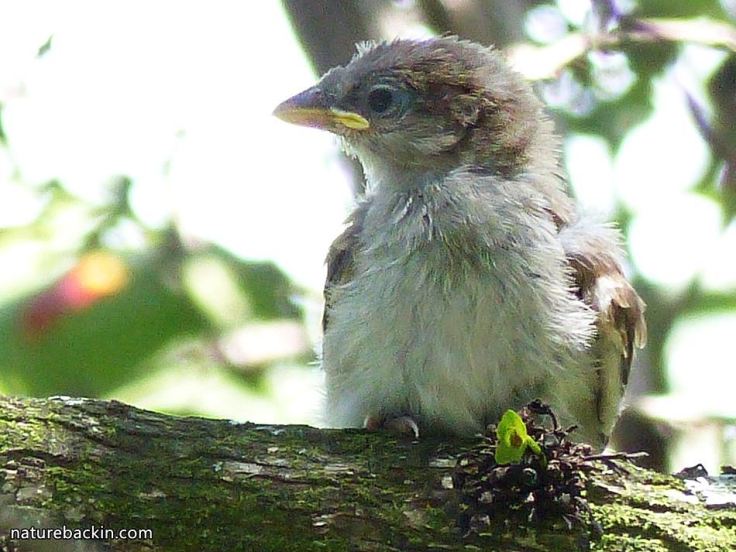
Well-fed and relatively safe high up in the tree, the fledgling seemed to regain its confidence and its prospects for survival seemed good

With the youngster safe and the drama of the rescue over, one of the parents took the time to chirrup enthusiastically for several minutes from a nearby branch
We learned a lot from witnessing this well-coordinated rescue by the sparrow parents. There is so much going on in nature that we completely overlook or misunderstand, and watching the tiny sparrows cope successfully with this adversity was really humbling. For more information on what to do if you find a baby bird, see this post from the Audubon Society of Portland, http://audubonportland.org/wcc/urban/babybirds
Posted by Carol

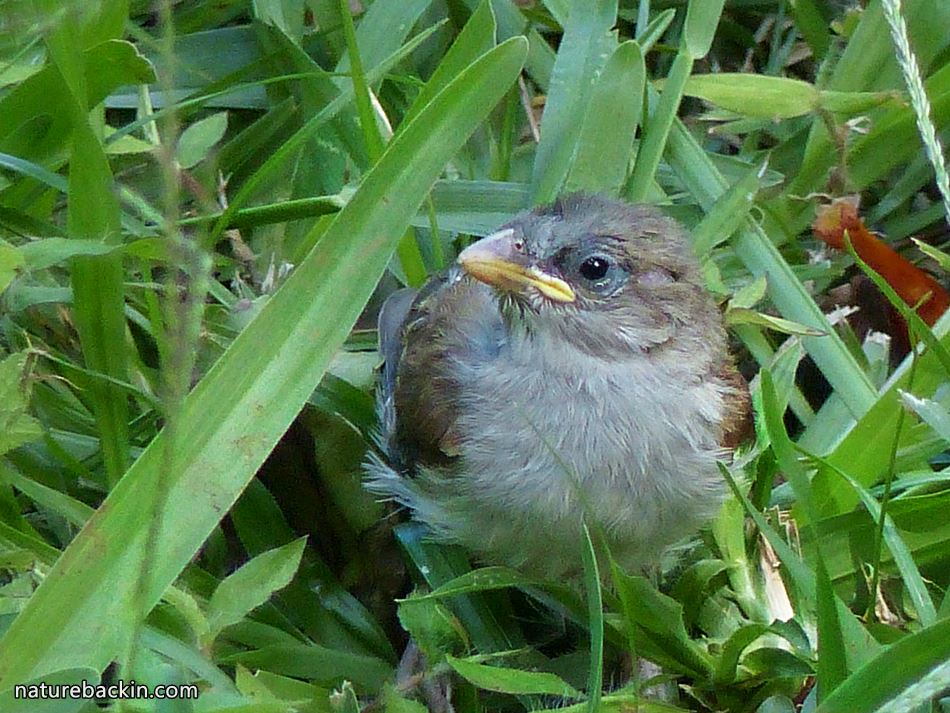

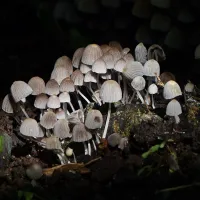
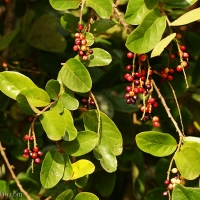
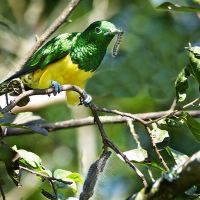
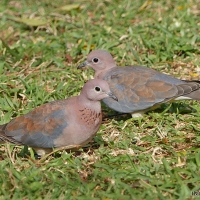

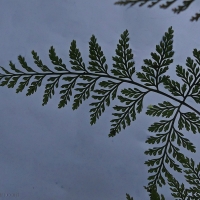
March 8, 2018 at 7:10 pm
Wow this is an amazing tale highlighted with amazing photos. I am jealous 🙂
LikeLiked by 1 person
March 8, 2018 at 9:55 pm
Thanks Abrie. The parent sparrows are now busily feeding a second brood this season!
LikeLike
February 10, 2018 at 6:39 am
Thank you for documenting and sharing this amazing experience. Besides baby birds, we have the same problem with baby seals left on our beaches. Folks seem to think the babies have been abandoned, when the fact is that the mother has simply gone to the ocean to feed. She is apt to abandon the seal pup if humans have interfered.
LikeLiked by 2 people
February 11, 2018 at 3:01 pm
Thanks Gunta. I hope there are ways of informing people that interfering with such baby seals is unnecessary and can in fact be harmful.
LikeLike
February 11, 2018 at 6:11 pm
Oh, they try to inform the public with signs and leaflets, but there are always idiots who think they know better. I think our biggest problem is dogs that are allowed to run loose on the beaches with little or no supervision from the owners. If caught, they could be ticketed, but there really isn’t much enforcement. We’ve been known to ‘educate’ some folks. We get various reactions: some folks seem willing to cooperate, while others can get defensive or even hostile. I see it as a sad comment on our human race.
LikeLiked by 1 person
February 15, 2018 at 8:05 pm
It is disturbing that so many people have so little consideration or insight, even when they should know better. It is sad indeed.
LikeLike
February 10, 2018 at 2:36 am
What a fascinating account, Carol, and so glad for the happy ending!
LikeLiked by 1 person
February 11, 2018 at 2:58 pm
Thanks very much – we were also very pleased at the happy ending.
LikeLike
February 10, 2018 at 12:35 am
Interesting. I always thought little birds were doomed if they fell out of the nest. I guess I’ve been watching the wrong nature shows!
LikeLiked by 1 person
February 11, 2018 at 2:57 pm
I think baby birds are in real trouble if they fall from the nest while still in the pre-fledgling featherless nestling stage, and the advice I have read is that if one is able to get the nestling back into the nest, or even into a temporary artificial “nest” nearby, the parents won’t reject the nestling, and will raise it if at all possible. That said, possibly some nature shows have a tendency to overly dramatise events?
LikeLike
February 9, 2018 at 10:17 pm
A heartening photo story! Nature does know best.
LikeLiked by 2 people
February 11, 2018 at 2:50 pm
Thanks Eliza. This was a very good example of Nature doing better without us!
LikeLiked by 1 person
February 9, 2018 at 6:02 pm
Very informative post, with a happy ending and terrific photos!
LikeLiked by 1 person
February 11, 2018 at 2:45 pm
Thanks Belinda. We were so relieved with the happy outcome after the fledgling’s misadventure.
LikeLiked by 1 person
February 9, 2018 at 5:05 pm
What a harrowing experience for the fledgling! You were wise to stand back and let
the parents step in.
You did a wonderful job of capturing the whole adventure!
LikeLiked by 1 person
February 11, 2018 at 2:44 pm
Thanks Sandy. That fledgling was incredibly plucky,
LikeLiked by 1 person
February 9, 2018 at 4:24 pm
I enjoyed the story and images.
LikeLiked by 1 person
February 20, 2018 at 1:38 pm
Thank you Sherry.
LikeLike
February 9, 2018 at 2:54 pm
Excellent post and sound advice, and smashing photos.
LikeLiked by 1 person
February 11, 2018 at 2:41 pm
Thanks so much Ark.
LikeLike
February 9, 2018 at 2:35 pm
Wonderful story and wonderful photos as ever, Carol. And excellent advice too!
LikeLiked by 1 person
February 11, 2018 at 2:40 pm
Thanks Sandra. Lovely to see the parent birds demonstrate that they are capable of looking after fledglings even under such circumstances.
LikeLiked by 1 person
February 9, 2018 at 12:16 pm
This is a heartwarming tale and a good lesson too. Thank you for sharing.
LikeLiked by 1 person
February 11, 2018 at 2:36 pm
Thanks Hester. Yes, we learned a lot watching this and I have an ever increasing respect for bird parents and their dedication and resourcefulness.
LikeLiked by 1 person
February 9, 2018 at 11:28 am
What a splendid tale! Thank you for sharing that.
LikeLiked by 1 person
February 11, 2018 at 2:32 pm
Thank you Nikki. Although I am sorry the fledgling had such a mishap, we certainly learnt a lot watching the rescue process, and so I was glad to be able to share it.
LikeLiked by 1 person
February 9, 2018 at 9:44 am
An excellent lesson to us all, Carol – to stand back. Am amazed to see a fledgling climbing a tree.
LikeLike
February 11, 2018 at 2:29 pm
Thanks Tish. We were also amazed!
LikeLiked by 1 person
February 9, 2018 at 8:39 am
What a great story, and wonderfully documented too. Your southern grey-headed sparrows seem remarkably similar to our old world sparrows, or at least to the females. I’m used to more exotic fare from you, although sadly, sparrows are hugely in decline here.
LikeLiked by 1 person
February 11, 2018 at 2:29 pm
Thanks Margaret. We do get House Sparrows here. They are an introduced species and are mostly confined to urban areas. Their numbers are also declining and there are none in our area now. I don’t know the reason for this decline.
LikeLike
February 9, 2018 at 7:16 am
This is a wonderfully documented account of why we should leave fledglings alone.
LikeLike
February 11, 2018 at 2:27 pm
Thanks Anne. We were amazed at the resourcefulness of both the parents and the fledgling.
LikeLike
February 9, 2018 at 6:57 am
Very interesting post!
LikeLiked by 1 person
February 11, 2018 at 2:26 pm
Thanks, Simone.
LikeLiked by 1 person
February 9, 2018 at 6:24 am
Brilliant observation and pics Carol. Bravo. I enjoyed much.
LikeLiked by 1 person
February 11, 2018 at 2:25 pm
Thanks very much, Frank. It was a special to be able to witness this process.
LikeLiked by 1 person